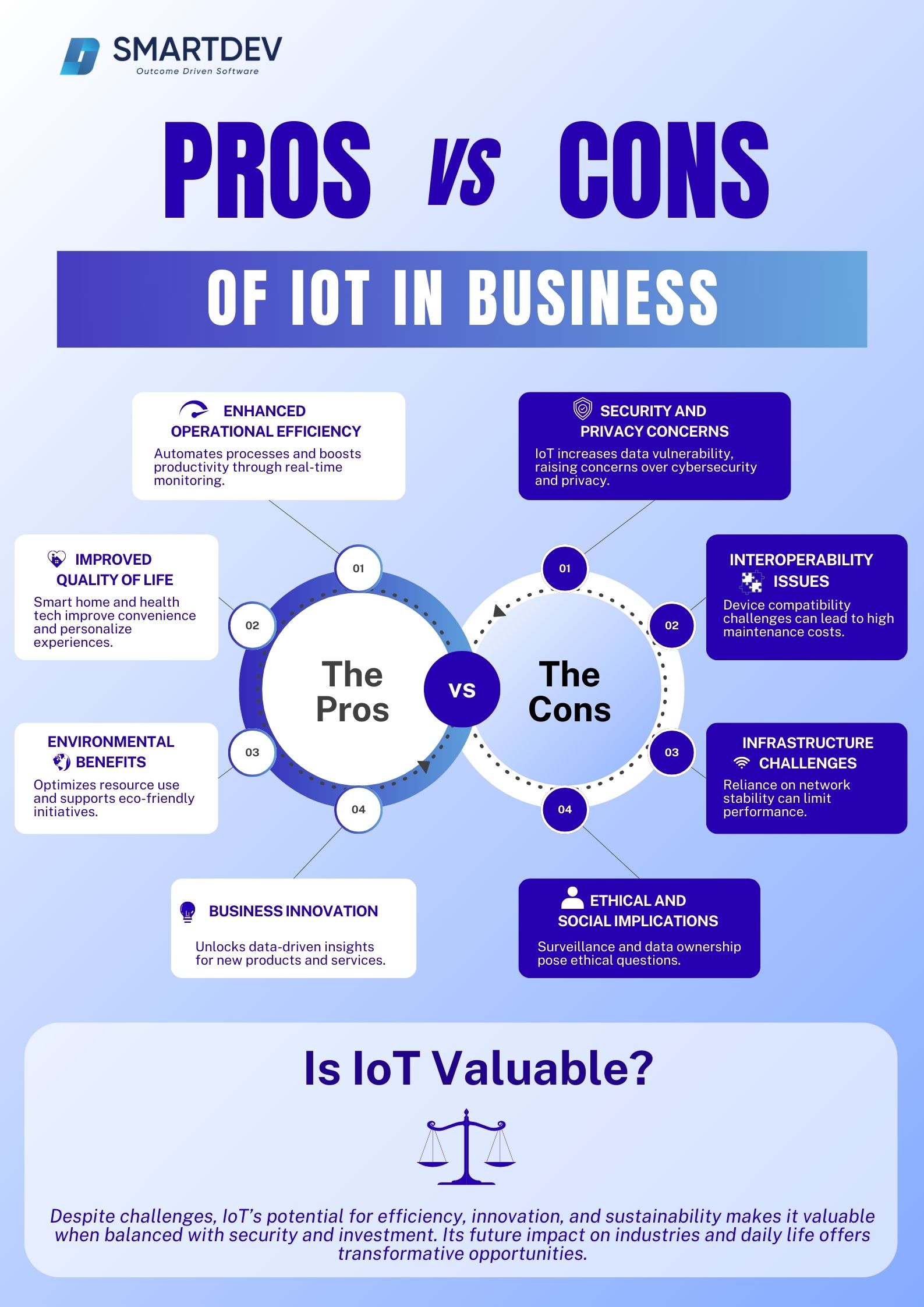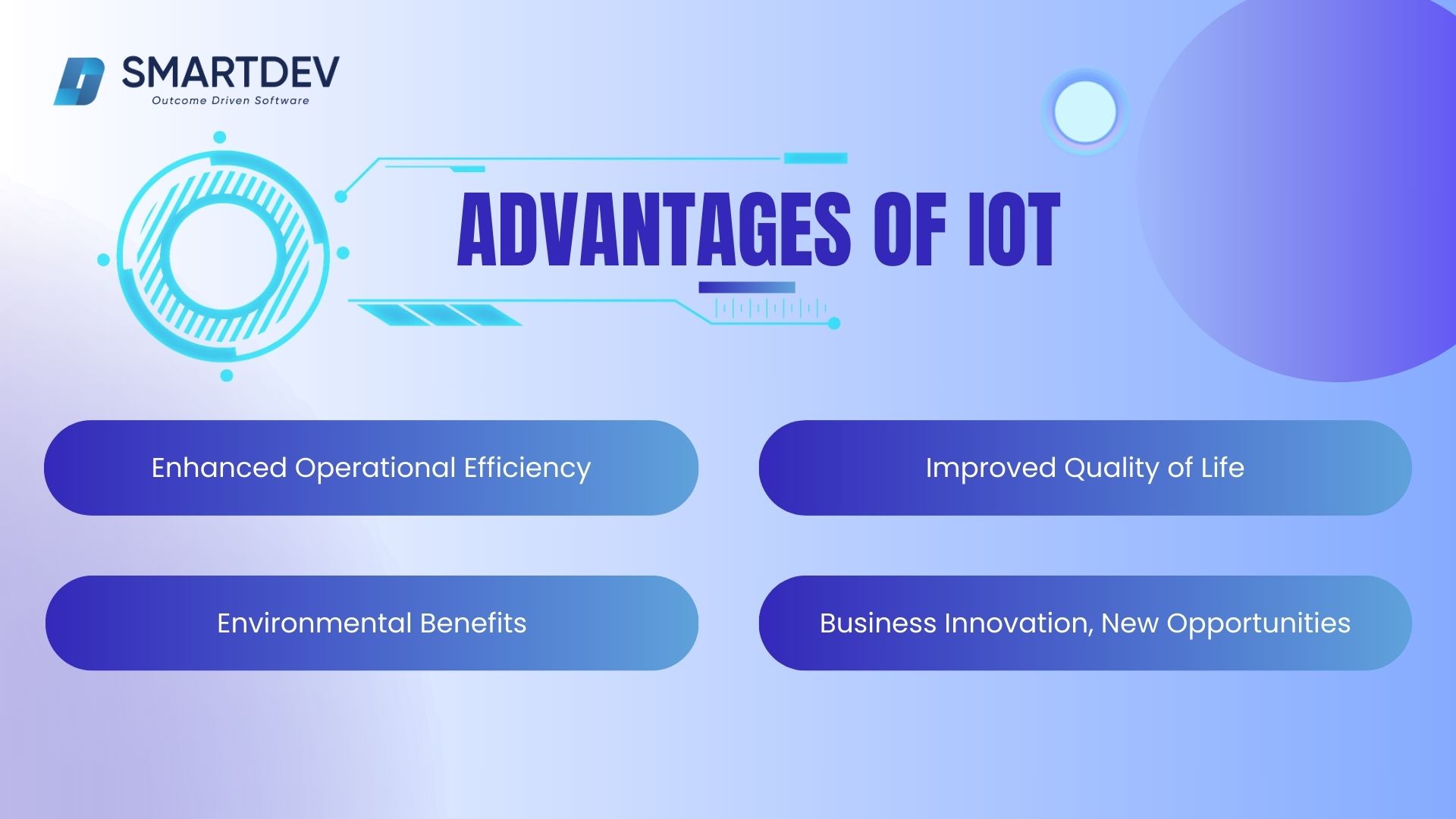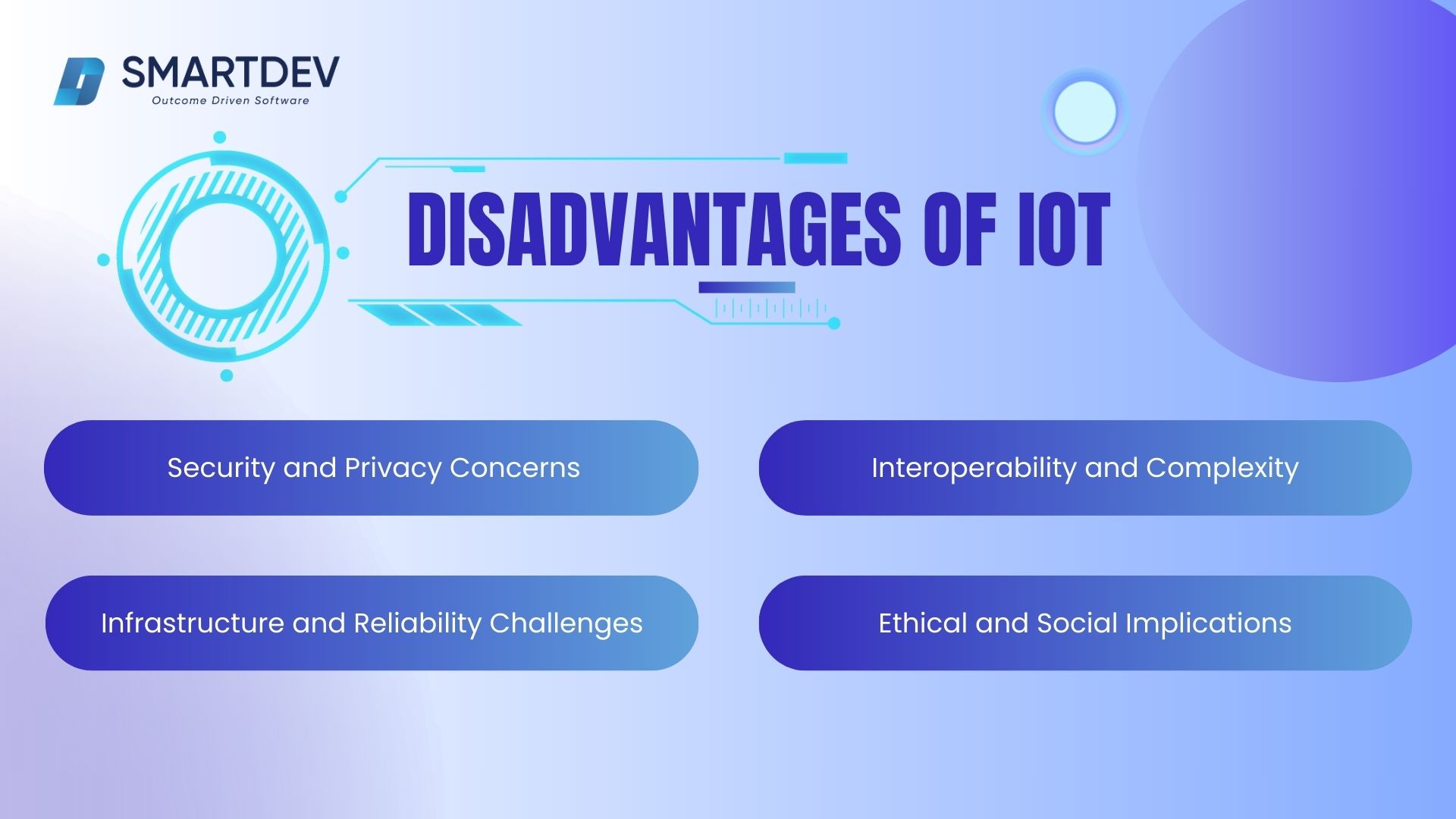The Internet of Things (IoT) is changing the game for businesses by connecting devices, processes, and people in unprecedented ways. It promises to boost efficiency, drive productivity, and make everyday operations smoother and more convenient. It promises to boost efficiency, drive productivity, and make everyday operations smoother and more convenient.
According to MarketsandMarkets, the IoT market is set to hit $650.5 billion by 2026, as more businesses embrace data-driven decision-making, cloud integration, and automation.
But like any technology, IoT isn’t without its hurdles. Security concerns, complex integration, and increased costs are IoT challenges that can’t be ignored.
In this blog, we’ll take a balanced look at the pros and cons of IoT for businesses, helping you understand both the opportunities and the risks involved.
 Quick Overview of IoT in Business
Quick Overview of IoT in Business
Below is a quick overview that outlines both the pros and cons of IoT in business environments. This summary provides a balanced perspective before delving into more detailed explanations.
Advantages of IoT
Disadvantages of IoT
Enhanced Operational Efficiency
Improved Quality of Life
Environmental Benefits
Business Innovation and New Opportunities
Security and Privacy Concerns
Interoperability and Complexity
Infrastructure and Reliability Challenges
Ethical and Social Implications
Advantages of IoT
 1. Enhanced Operational Efficiency
1. Enhanced Operational Efficiency
Operational efficiency is one of the biggest reasons businesses are investing in IoT. With IoT, companies can gather real-time data to track performance and optimize processes. This ability to keep an eye on things as they happen means fewer inefficiencies, faster decisions, and smoother workflows.
- Real-Time Data Collection: IoT’s real-time data collection allows businesses to monitor performance continuously, which means instant adjustments and fewer bottlenecks. This responsiveness ensures better resource allocation and minimizes waste.
- Process Automation: Automating routine tasks with IoT means less human intervention, which in turn reduces errors and cuts costs. Whether it’s managing inventory or performing maintenance, IoT automation frees up human resources for more strategic work.
2. Improved Quality of Life
IoT isn’t just about making business operations smoother—it also makes life easier for both employees and customers.
- Enhanced Customer Experience: IoT allows companies to offer highly personalized experiences. By analyzing real-time usage data, smart devices can adjust services or make recommendations that cater to individual preferences, delivering a better overall customer experience.
- Remote Accessibility: IoT devices can be monitored and managed from anywhere. This is particularly helpful in industries like healthcare or smart home tech, where remote control means better service and increased convenience for users.
3. Environmental Benefits
Many businesses are making sustainability a core focus, and IoT helps them get there by optimizing resource usage and cutting down on waste.
- Resource Management: IoT solutions can track and manage resource consumption, such as water, electricity, or raw materials. This helps companies be more efficient and cut costs while also reducing their environmental impact.
- Reduced Operational Waste: Sensors in IoT systems provide insights into inefficient processes, helping businesses eliminate waste and operate more sustainably, all while saving money.
4. Business Innovation and New Opportunities
IoT, as a catalyst for innovation, opens doors to new products, services, and completely fresh business models.
- Data-Driven Decision-Making: IoT devices generate a wealth of data, offering insights that drive strategic business decisions. By predicting trends and understanding customer needs, businesses can stay ahead of the curve and better serve their markets.
- Competitive Edge: Early IoT adopters can innovate faster and with greater impact. Access to extensive data and automation means businesses can create unique offerings that help them stand out from the competition.
Disadvantages of IoT

1. Security and Privacy Concerns
While IoT offers numerous advantages, its increased connectivity also brings significant risks, particularly concerning data security.
- Cybersecurity Risks: With each new connected device comes an additional entry point for hackers. Businesses need to ensure that their security measures are up to par to prevent unauthorized access and data breaches.
- Data Privacy Issues: IoT collects vast amounts of data, often including sensitive information. Mishandling this data can lead to privacy violations, regulatory fines, and a loss of consumer trust.
2. Interoperability and Complexity
The more devices you add, the more complicated the system becomes—especially when those devices come from different manufacturers.
- Integration Challenges: Many IoT solutions lack standardization, which makes integrating devices from multiple vendors a challenge. This can hinder the smooth functionality of a mixed IoT ecosystem.
- Increased Management Costs: Keeping all these devices compatible takes effort. Businesses need to invest in ongoing software updates, device maintenance, and specialized staff, which can increase overall costs.
3. Infrastructure and Reliability Challenges
IoT relies heavily on stable infrastructure to keep everything running smoothly—but that can also be a major limitation.
- Network Dependency: IoT devices need consistent network connectivity. If the internet connection is unstable, the performance of IoT devices may degrade, potentially interrupting business operations.
- Reliability Concerns: Many IoT solutions depend on reliable high-speed networks. Businesses in regions with poor internet infrastructure may find it challenging to adopt IoT fully.
4. Ethical and Social Implications
The widespread adoption of IoT brings up several ethical questions, particularly regarding privacy and constant monitoring.
- Privacy Concerns: IoT devices gather huge amounts of user data, which raises ethical questions about consent, transparency, and data usage. Addressing these concerns is crucial for maintaining user trust.
- Surveillance and Monitoring: IoT can enable near-constant monitoring, which can make people uncomfortable, particularly in public spaces. Balancing IoT’s capabilities with respect for individual privacy is a growing concern, especially as smart cities become more common.
Is IoT Valuable?
1. The Value of IoT Lies in Its Potential for Transformation
The true power of IoT lies in its ability to connect devices, collect real-time data, and automate processes. This seamless integration between the physical and digital worlds allows for more informed decision-making, streamlined operations, and enhanced customer experiences.
For businesses, the value of IoT is often directly linked to operational efficiency and improved productivity. Imagine a smart factory where machines autonomously report their maintenance requirements before problems arise, reducing costly downtimes. Or a retail environment where IoT sensors monitor inventory levels in real-time, ensuring products are always available to meet customer demands. By providing a constant flow of actionable data, IoT helps businesses predict, adapt, and respond proactively—fundamentally changing how industries operate and boosting their competitiveness.
IoT also serves as a catalyst for innovation, creating new revenue streams and driving the development of fresh business models. Companies can now offer subscription-based services that adapt in real-time to customer behavior or implement predictive maintenance solutions that prevent issues before they occur. Early adopters of IoT are not only able to innovate more rapidly but also create unique value propositions that differentiate them from competitors. As the technology matures, we can expect to see entirely new business ecosystems emerge, driven by the power of connected devices.
Remember that the value of IoT is directly linked to how well these challenges are managed. Those who can successfully navigate the complexities will unlock the full potential of IoT, reaping the benefits of enhanced efficiency, innovation, and customer satisfaction.
2. Future-Ready Innovation
Looking ahead, IoT is likely to expand across various industries, from healthcare to smart cities to environmental conservation. Early adopters of IoT will have a significant advantage, driving advancements in efficiency and customer experience. As green IoT solutions gain momentum, the role of IoT in shaping a sustainable future becomes even more apparent.
Read more: The Future of IoT in Office Workspaces
We can say that ultimately, the value of IoT depends on how well businesses manage the associated risks while maximizing its potential.
SmartDev can help guide your journey through the evolving landscape of IoT, ensuring you’re prepared for what’s ahead. Reach out to us today, and let’s shape the future of connectivity together.
FAQs
1. What are the main advantages of IoT?
The main advantages include enhanced operational efficiency, improved customer experience, better resource management, and fostering innovation through data-driven decision-making.
2. How does IoT enhance everyday life?
IoT devices provide convenience through smart home technologies, personalized services, remote monitoring, and enhanced connectivity, which improves the quality of life.
3. What are the primary security concerns with IoT?
The main security concerns include vulnerabilities to cyber-attacks and potential data privacy issues due to the vast amounts of data collected by IoT devices.
4. How does IoT impact job markets?
IoT may displace certain manual jobs through automation, while also creating new opportunities in fields like data analytics, IoT system development, and IT management.
5. What are the downsides of relying on IoT?
The downsides include security risks, challenges related to device compatibility, increased management costs, infrastructure reliability concerns, and ethical issues related to data privacy and surveillance.
References
- How to create a successful IoT business model—Insights from successful OEMs – IOT Analytics
- Top 7 Advantages and Disadvantages of IoT Explained – The IoT Academy
- 29 Facts About IoT Devices – Facts.net
- What is the Internet of Things (IoT)? – McKinsey & Company
- The Impact of the Internet of Things on Business: Benefits and Drawbacks – Tamoco Blog
- Security and Privacy Concerns in IoT – IBM

 1. Enhanced Operational Efficiency
1. Enhanced Operational Efficiency






